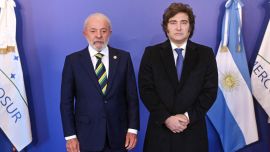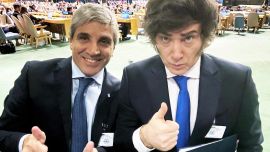Argentina must “stay the course” with President Javier Milei’s economic reforms if it is to “clean up” its economy, says International Monetary Fund Managing Director Kristalina Georgieva.
Speaking at the multilateral lender’s spring meetings in Washington, co-organised with the World Bank, IMF chief Georgieva again threw her full support behind the Milei administration, stating that “Argentina has shown that this time it's different.”
The comments come just a fortnight after the IMF agreed a US$20-billion programme with Argentina, of which Buenos Aires has already received US$12 billion.
The deal includes fresh disbursements, extended repayment terms, and stricter policy benchmarks — including commitments on fiscal consolidation and inflation control.
The agreement was endorsed by the IMF board in March following intense negotiations and is seen as a crucial step for stabilising Argentina’s volatile economy and restoring international credibility.
If all aid from the World Bank (WB) and the Inter-American Development Bank (IDB), among other institutions, announced in the past month is added up, Argentina has won the support of US$42 billion to support Milei’s bid to correct the economy.
The injection of fresh money should help boost Central Bank reserves, stabilise the peso and assist efforts to tame inflation (which fell from 211 percent year-on-year at the end of 2023 to 55.9 percent in March 2025, the latest figure available).
Following the influx of cash, the Milei government lifted the majority of currency and capital controls, which have been in place since 2019. The peso is now allowed to float between bands, with a minimum of 1,000 and a maximum of 1,400 pesos per greenback.
“Argentina has shown that this time it is different. This time there is determination to clean up the economy,” Georgieva said at a press conference Thursday.
It has demonstrated this by “moving from a high deficit to a surplus, from double-digit inflation to inflation that in February fell below three percent, from poverty at over 50 percent to around 37 percent, still very high, but declining,” said the IMF chief, hailing Argentina as an example for other nations to follow.
“The state is giving up its role to allow more dynamism in the private sector,” he added of the reforms pushed by Milei.
It would be a risk for the country to implement the changes alone, but Argentina is accompanied in the process, Georgieva highlighted.
“When the programme was announced, the immediate impact on the markets was positive, because, among other things ... the country is not alone. We are there, the World Bank is there, the Inter-American Development Bank is stepping up its work,” she explained.
Georgieva stressed that the new IMF loan, the 23rd in Argentina’s history, is not risk-free.
“A worsening of the global environment, all things being equal, would have a negative impact on Argentina” and at the national level “it is very important that the will for change is not derailed” by the legislative elections in October, Georgieva said.
“So far, we do not see that risk materialising, but I urge Argentina to stay the course,” the IMF chief stressed.
Forecast held
The IMF said this week it would maintain its 5.5 percent growth projection for Argentina in 2025, despite global trade uncertainty.
The multilateral lender cited “positive data” seen in the early months of the year. It acknowledged that tighter fiscal policy had been offset by a rise in market confidence, allowing it to hold its forecast despite mounting global uncertainty.
“We still have that forecast basically because of the positive numbers we saw,” said Petya Koeva Brooks, a senior economist at the IMF, speaking at a press conference. “Despite the fiscal adjustment, there was an increase in confidence and that allows us to sustain the projection.”
However, Brooks warned that the outlook was subject to greater risk amid rising financial restrictions and price effects triggered by an increasingly unstable global context.
The IMF downgraded its global forecast to 2.8 percent, urging governments to restore predictability in trade relations and ensure monetary policy remains flexible.
Georgieva said earlier this week that maintaining its current policies could encourage the repatriation of wealth held outside the banking system, informally or overseas, by Argentines.
“I was told — I don’t know if it’s true — that there’s more than US$200 billion under the mattress and God knows where else. If that money were invested in Argentina, just imagine what that country would be,” the IMF chief said at the event.
– TIMES/AFP/NA

























Comments